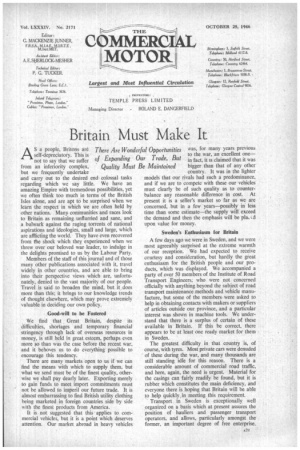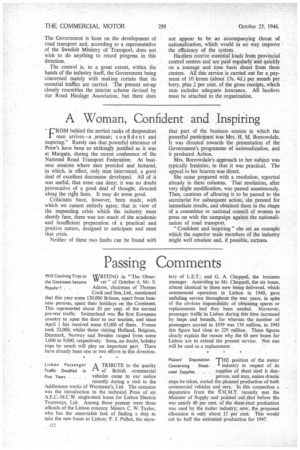Britain Must Make It
Page 23

Page 24

If you've noticed an error in this article please click here to report it so we can fix it.
S a people. Britons are self-depreciatory. This is not to say that we suffer from an inferiority complex, but we frequently undertake and carry out to the desired end• colossal tasks regarding which we say little. We have an amazing Empire with tremendous possibilities, yet we often think too much in terms of the British Isles alone, and are apt to be surprised when we learn the respect in which we are often held by other nations. Many communities and races look to Britain as remaining unflurried and sane, and a bulwark against the raging torrents of national aspirations and ideologies, small and large, which are afflicting the world. They have even recovered from the shock which they experienced when we threw over our beloved war leader, to indulge in the delights promised to us by the Labour Party.
Members of the staff of this journal and of those many other publications associated with it, travel widely in other countries, and are able to bring into their perspective views which are, unfortunately, denied to the vast majority of our people. Travel is said to broaden the mind, but it does more than this; it brings to our knowledge trends of thought elsewhere, which may prove extremely valuable in deciding our own policy.
Good-will to be Fostered We find that Great Britain, despite its difficulties, shortages and temporary financial stringency through lack of overseas resources in money, is still held in great esteem, perhaps even more so than was the case before the recent war, and it behoves us to do everything possible to encourage this tendency.
There are many markets open to us if we can find the means with which to supply them, but what we send must be of the finest quality, otherwise we shall pay dearly later. Exporting merely to gain funds to meet import commitments must not be allowed to imperil our future trade. It is almost embarrassing to find British utility clothing being marketed in foreign countries side by side with the finest products from America.
It is not suggested that this• applies to commercial vehicles, but it is a point which deserves attention. Our market abroad in heavy vehicles was, for many years previous to the war, an excellent one— in fact, it is claimed that it was bigger than that of any other country. It was in the lighter models that our rivals had such a predominance, and if we are to compete with these our vehicles must clearly be of such quality as to counterbalance any reasonable difference in cost. At present it is a seller's market so far as we are concerned, but in a few years—possibly in less time than some estimate—the supply will exceed the demand and then the emphasis will be pia,t.d upon value for money.
Sweden's Enthusiasm for Britain A few days ago we were in Sweden. and we were most agreeably surprised at the extreme warmth of our reception. We had expected to receive courtesy and consideration, but hardly the great enthusiasm for the British people and our products, which was displayed. We accompanied a party of over 50 members of the Institute of Road Transport Engineers; who were not concerned officially with anything beyond the subject of road transport maintenance methods and vehicle manufacture, but some of the members were asked to help in obtaining contacts with makers or suppliers of articles outside our province, and a particular interest was shown in machine tools. We understand that there is a surplus of certain of these available in Britain. If this be correct, there appears to be at least one ready market for them in Sweden.
The greatest difficulty in that country is, of course, with tyres. Most private cars were denuded of these during the war, and many thousands are still standing idle for this reason. There is a considerable amount of commercial road traffic, and here, again, the need is urgent. Material for the casings can fairly readily be found, but it is rubber which constitutes the main deficiency, and everyone there is hoping that Britain will be able to help quickly in meeting this requirement.
Transport in Sweden is exceptionally well organized on a basis which at present assures the position of hauliers and passenger transport operators, and allows, particularly amongst the former, an important degree of free enterprise.
The Government is keen on the development of road transport and, according to a representative of the Swedish Ministry of Transport, does not 'wish to do anything to retard progress in this direction.
The control is, to a great extent, within the hands of the industry itself, the Government being concerned mainly with making certain that its essential traffics are carried. The present set-up closely resembles the interim scheme devised by our Road Haulage Association, but there does not appear to be an accompanying threat of nationalization, which would in no way improve the efficiency of the system.
Hauliers receive essential loads from provincial control centres and are paid regularly and quickly on a tonnage and time basis direct from these centres. All this service is carried out for a payment of 10 krone (about 13s. 4d.) per month per lorry, plus 2 per cent. of the gross receipts, which sum includes adequate insurance. All hauliers must be attached to the organization.












































































